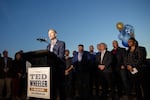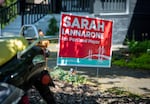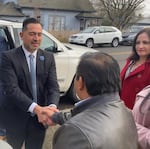Like every major city in America, Portland is bracing for an uncertain future.
Tax revenue is drying up; the city's chief administrative office has warned of a revenue drop worse than during the Great Recession. The businesses that give the city its reputation — restaurants, music venues, food carts — don't know when customers will return. Construction is expected to slow. Tourism has stopped.
Related: Emergency Cash Fund For Portlanders Overwhelmed In Minutes
The task of placing the city on the right track will, in large part, fall to the mayor. On May 19, Portlanders will decide if they want to give incumbent Ted Wheeler another term or vote in someone new. If no candidate gets more than 50% of the vote, the top two will compete in a November runoff.
Of the 18 candidates whose names will appear on the ballot alongside Wheeler's, three have mounted significant campaigns: community organizer Teressa Raiford, sustainability consultant Ozzie González and urban policy consultant Sarah Iannarone, whose large fundraising haul has led her to be widely viewed as the mayor's most significant opponent.
Wheeler’s challengers contend that Portland should aspire to not only regain what it has lost but also rebound from the pandemic a fairer, greener and more resilient city. Meanwhile, the mayor — Portland’s first in two decades to seek a second term — has underscored the need for a stable hand to steer the city through its recovery period. Now, he argues, is not the time to change course.
"If the COVID crisis teaches us anything, it's that this is a time for leadership. This is not a time to experiment or flip over the apple cart again," Wheeler said recently during what was almost certainly the first virtual debate in Portland's history. "Because, frankly, that's what we've been doing every four years since the beginning of the century."
Trying to make history in a pandemic
Since Wheeler first announced he would seek another term, this promise of stability has been at the heart of his reelection bid.
"There's a reason we haven't had a two-term mayor since Vera Katz," the mayor told a crowd of supporters at his rooftop reelection ceremony back in October. "We haven't had someone willing to keep going because this job is hard, and it's often thankless. But we need people who are willing to keep going."

Portland Mayor Ted Wheeler announces his reelection campaign Monday, Oct. 15, 2019, in Portland, Ore. Few mayors in recent history have sought a second term.
Rebecca Ellis / OPB
With no well-known name challenging Wheeler, business and labor groups quickly threw their support behind the incumbent. Citing a strong relationship with the mayor, Andrew Hoan, the president of the Portland Business Alliance, told the crowd that October night, “Business is with Ted Wheeler.” Since then, the alliance has conducted a formal endorsement process: Business is still with Wheeler.
"We're really appreciating this level of engagement and this type of leadership," said Hoan. "Especially in these transitionary moments that we're facing now as a community, having that stable leadership that understands how to run a bureau, understands how to work with colleagues very well. Those are the reasons we're getting behind him."
Related: Portland Mayor's Mailer Claims Chloe Eudaly Endorsed Him. She Didn't
It’s not every election cycle that business and labor endorse the same candidate, but the region’s big unions have also coalesced behind the incumbent. UFCW Local 555, AFSCME Local 189, SEIU and the Northwest Labor Council are all listed as endorsements under Wheeler’s headshot in the voter pamphlet.
“We’ve had several mayors that were just one term mayors,” said Bob Tackett, executive secretary-treasurer for the Northwest Oregon Labor Council. “It takes a while for a mayor to get his feet under him, learn the ropes. It just seems that if they're doing a decent enough job, that you want to continue on the path that they seem to be going down.”
But back in October, at least, it wasn't clear everyone was pleased with the path. That month, polling found a whopping 58% of residents in the greater Portland region believed the area was on the wrong track. The problems the mayor vowed to prioritize when he announced his bid for a second term were the same issues he'd promised to address in the lead up to his first win: affordable housing and homelessness.
On a bullet-pointed list on his campaign's website titled "Record of Making Progress," Wheeler's campaign outlined the major steps he has taken to that end: doubling the city's shelter capacity, building 800 units of affordable housing, helping 6,000 Portlanders get into transitional housing, preventing 7,000 at-risk households from being forced onto the street.
Still, three and a half years into the mayor’s term, housing remains the city’s most pressing issue.
“People experiencing homelessness continues to be a top-tier issue,” said political consultant Jake Weigler, who ran Wheeler's mayoral campaign back in 2016. “And I think, frankly, before the pandemic [it] was far and away the top issue on people's mind.”
In the last two months, COVID-19 has taken the top slot as the all-consuming issue on voter’s minds. There’s a general consensus among the city’s political analysts that this has helped Wheeler, heightening all the advantages he was already set to enjoy as an incumbent: name recognition, media attention and the ability to tout a long resume of elected experience as mayor and a former Multnomah County chair and Oregon state treasurer.
“Experience matters, and the mayor has vast experience at the county level, at the state level, and now at the city level,” said Neel Pender, a public affairs consultant with Hilltop Public Solutions. “A leader that knows how to marshal the available resources and use the levers of government effectively to meet needs is particularly compelling ... in a time when people are scared and paying careful attention.”
Rather than stumble under the scrutiny, many see Wheeler hitting his stride since the public health crisis began.
Related: Governor, Portland Mayor, Multnomah Chair: Stay At Home, Stay Healthy
He's a major reason Gov. Kate Brown enacted her stay-at-home order when she did, galvanizing a coalition of local leaders to pressure the governor to shut down the state. Polling shows the vast majority of Oregonians are glad she did. Where critics have attacked the mayor in the past for being slow to deliver on needed policy, many see his office stepping up to meet the moment: delivering an eviction moratorium, a relief fund for small businesses and cash handouts for low-income Portlanders.
“When you compare with other leaders that we've seen at the national level, he's really miles ahead of others,” said veteran City Hall observer Len Bergstein, “in that ability to demonstrate compassionate leadership as well as concern for the nuts and bolts of solving a problem.”
A challenge from the left
While the mayor makes his pitch for consistent leadership, his leading contender, Sarah Iannarone, said he hasn’t done enough in his four years in office.
Related: Lawsuit Argues Portland Mayor Should Return All Contributions Over Voter-Approved Limits
She wants to stop the city's use of armed police at schools and abolish the police bureau's Gun Violence Reduction Team, which she called "simply racist." (The unit, rebranded from the Gang Enforcement Team, has been found to disproportionately make contact with black Portlanders.) She's campaigned for an end to sweeps of homeless camps and expressed interest in requiring all the city's new police officers live within city limits. She wants to decriminalize sex work. And that's just her public safety plan.
In interviews with OPB, Iannarone has argued that the aftermath of COVID-19 presents a chance for the city to reenvision itself rather than revert back to the status quo.
“We know that a return to normalcy is not going to be desirable for so many Portlanders, because the normal wasn't working for them. So this is a point where we can say, ‘Look at the air quality outside. Look at the fact that we haven't had traffic fatalities. Look at the fact that we're not having school shootings,’” she said. “Why would we go back?”
Iannarone first stepped onto Portland’s political scene in 2016 when she ran against Wheeler and former Multnomah County Commissioner Jules Bailey. She ultimately took 12% of the vote to Wheeler’s 55 and Bailey’s 17.

Portland mayoral candidate Sarah Iannarone poses for a portrait on March 25, 2015, in Portland, Ore.
John Rosman / OPB
Since her first bid for office, media outlets have plucked from various parts of her resume to describe her. She's been referred to as a tour-group official due to her tenure as an assistant director at Portland State University's First Stop Portland, which gives tours of the city's sustainability infrastructure to visiting delegations; a small business owner as she used to co-own the Arleta Library Bakery and Cafe, a Southeast Portland brunch spot now permanently closed due to COVID-19; an urban planning wonk due to her studies at Portland State University's urban studies and planning Ph.D. program.
(Iannarone says she never got around to defending her dissertation, despite completing all other requirements. This led many a Redditor to decry her use of the potentially misleading phrase "Ph.D (ABD)" on her voter pamphlet description: The first acronym is a well-known signifier of achievement in higher learning; the latter is a lesser-known acronym signifying the candidate has completed All But Dissertation.)
But perhaps the most common descriptor is a community organizer. Iannarone is well-known in her neighborhood of Mt. Scott-Arleta for rounding up neighbors for a common cause. She's helped spearhead makeshift warming shelters, memorials, and the transformation of the Arleta Triangle, a formerly shopping-cart littered traffic island turned pocket park. Despite no experience in elected office, her supporters say she's demonstrated skills that would make her a good mayor: an ability to make ambitious proposals feel pragmatic, a knack for problem-solving and coalition building.
“Those skills are easily applied to a large scale,” said Meghan Humphries, who has volunteered alongside Iannarone on the Mt. Scott-Arleta neighborhood association. “It’s just she hasn't had the opportunity to do that yet.”
Iannarone's progressive platform has earned her the endorsements of Portland’s chapter of the Sunrise Movement, a youth-led group advocating for action on climate change, and the Street Trust Action Fund, the political arm of the transit advocacy nonprofit. Sunrise Movement member Anna Kahler said none of its members voted to support the mayor, who they “don't see the urgency from.”
Jillian Detweiler, the executive director of the Street Trust, said Wheeler never returned their questionnaire. But, she said, the mayor’s absence from two big council hearings on transit-related city projects — Central City in Motion, a plan to build a more efficient transportation network downtown, and a two-year report on Vision Zero — would have likely taken him out of the running for their endorsement anyway.
In a candid interview with the Portland Mercury, Wheeler said the reason Iannarone was gaining traction was "probably the Bernie-crats." But whether Iananrone's call for dramatic change will resonate beyond Portlanders highly active in City Council meetings and on Twitter remains to be seen.
To unseat an incumbent, a challenger needs to rally a broad base, but analysts predict turnout for Oregon primaries will be lower than it would have been were the Democratic presidential primary still competitive. Getting people to pay attention to local politics is notoriously difficult.

A yard sign for Portland mayoral candidate Sarah Iannarone sits in front of a house in the Southeast Portland, Ore., neighborhood of Brooklyn on Monday, April 20, 2020.
Bryan M. Vance / OPB
“I was talking about Sarah with a friend of a friend I was having beers with,” said Catie Gould, a supporter of Iannarone who describes herself as deeply involved in activist communities. “And they said, ‘Oh, I think Charlie Hales is doing a great job as mayor.’”
“It really took a lot of air out of me,” said Gould, who volunteers alongside Iannarone on the city transportation bureau’s Bicycle Advisory Committee. “I was like, ‘No, that was a different white guy.’”
Running to reduce gun violence and make Portland greener
This race has drawn headlines, mostly over issues of campaign finance — namely, who is cashing big checks and who isn’t.
Two years ago, Portland voters agreed to set a $500 limit on contributions, though the implementation of that rule was delayed by a court fight. At the campaign's outset, the mayor said he would set a contribution cap of $5,000 from individuals and $10,000 from organizations. (Last month, he lowered that limit to $500 after the Oregon Supreme Court ruled in favor of the strict campaign finance limits.) 34Iannarone, meanwhile, has had success with the city's new publicly financed election program, in which small-dollar donations get matched 6-1 by city dollars.

A house displays signs for Canda Avalos, a Portland City Council candidate, and Teressa Raiford, a Portland mayoral candidate, in the front yard in the Southeast Portland neighborhood of Brooklyn on Monday, April 20, 2020.
Bryan M. Vance / OPB
But some say using money as a bellwether for support has denied two other significant candidates deserved attention: Ozzie González and Teressa Raiford, both of whom have raised under $100,000.
"When you use raising of money as the standard for who you're going to include and who you're going to exclude, you are 100% disenfranchising communities that haven't previously had a lot of experience within the political scene,” said Rachelle Dixon, vice-chair of the Multnomah County Democrats. “And you're playing more into the hands of the incumbent and to the power base that exists — and in Oregon that would be the white community.”
Raiford has been campaigning against the mayor since at least 2017, when she fired off a Tweet telling him to get out of her seat. Despite supporting him in his initial bid for mayor, she said she was fed up with his failure to address issues related to police accountability. She thought she could do better.

Teressa Raiford speaks at a Don't Shoot PDX-organized rally on Portland State University's campus.
Bradley W. Parks / OPB
As the founder of nonprofit Don’t Shoot Portland, which provides support for families impacted by gun violence, Raiford has been a prominent voice on issues related to gun violence and the local Black Lives Matter movement since before Wheeler took office. She has organized rallies around the issue of police brutality and sued the city after being arrested at one of them.
Since launching her campaign in earnest, Raiford has been outspoken about changing the city’s form of government so commissioners are elected to represent districts rather than the entire city. Like Iannarone, she has called for an end to school resource officers and homeless camp sweeps. She wants to abolish the practice of community policing, expressing concern that encouraging officers to become a neighborhood fixture will lead to discrimination and over-policing.
Related: No Door Knocking, No House Parties: Is COVID-19 Bad For Political Challengers?
But she says it’s at times been difficult to gain traction on her principal issue: gun violence.
“We've had over 63 shootings in Portland, and none of the platforms I've been provided have ever brought that up,” she said. “Debates, forums, interviews, no one talks about the gun violence except for the people in Southeast Portland and East Portland that are experiencing it. And it’s really sad, because public safety should be on the forefront of what we’re all dealing with.”
Like Raiford, sustainability consultant Ozzie González has pushed to bring the topics he’s well-versed in — sustainability and equity — to the forefront of the debate.
With training as an architect and an environmental scientist, González now runs a consulting company where he advises on best practices related to sustainability and diversity and inclusion. He sits on various boards, including TriMet, the Oregon Association of Minority Entrepreneurs and the Hispanic Metropolitan Chamber.
As part of his campaign, he's called to phase out all landfill waste within 10 years. He wants to create more structured career paths so young Portlanders can more easily access green jobs. And he's floated a strategy for creating a more localized food system, which he says could enable Portland to grow 30% of its own food within the decade, a plan with new relevance as the coronavirus threatens to disrupt supply chains across the country.

Ozzie Gonzalez is running for Portland mayor.
Courtesy of Ozzie Gonzalez
But, as a newcomer to Portland electoral politics, he said he’s found it difficult to break through.
“When I stepped in, I thought, ‘The city is going to be very receptive to a new voice,’” González said. “Something I've been surprised by is, it's been very challenging to find and feel that receptivity here despite how much we talk about our interest in having that voice.”
Ballots are due May 19. They must be in the mail by Thursday, May 14. Ballots can be dropped off at official drop sites until 8 p.m. on primary night.
Subscribe To 'OPB Politics Now'
Subscribe to the show on NPR One, Apple Podcasts or wherever you find your podcasts. Need to get in touch? Contact us here.
